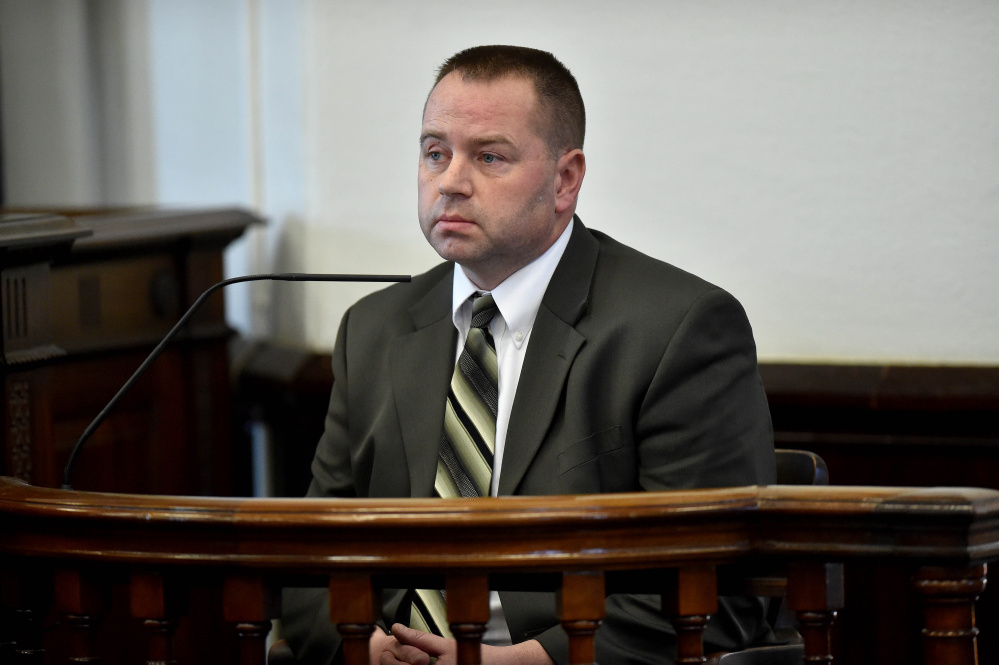SKOWHEGAN — Prosecutors contend that Kayla Stewart’s baby was born alive and healthy but died after she either suffocated it or left it to die in December in her cold garage and that she allegedly told a state police detective that she “made sure (the baby) was dead.”
Superior Court Justice Robert Murray, based on that statement and information presented Friday in Somerset County Superior Court, granted Assistant Attorney General John Alsop’s request that Stewart be held without bail at the Somerset County Jail on the charge she murdered the newborn infant.
Stewart, 20, of Fairfield, according to the probable cause affidavit, had told police conflicting stories about what happened to the baby, including that she had a miscarriage and flushed it down the toilet at home and that the baby was dead, not breathing and with eyes closed, when she gave birth to it in the unattached garage at the 457 Norridgewock Road home she shared with her boyfriend, Nicholas Blood.
State police found the full-term baby boy Jan. 11, with the placenta still attached, wrapped in a blanket and trash bags under an oil tank and behind a sheet of insulation after Stewart’s mother had called police with her concerns about the baby’s fate two days earlier, according to the affidavit written by Maine State Police Detective Scott Bryant, which had been sealed until Friday’s Harnish hearing.
The autopsy report by the Office of the Maine Medical Examiner said that the baby’s height, weight and size were consistent with that of a full-term baby and the color of the baby and the fact his lungs had drawn air indicated it was born alive.
The cause of death was reported to be a homicide from suffocation or smothering, or neglect — being left to die in a cold garage with a lack of care.
Alsop called Stewart’s behavior bizarre, and he used it as an argument for not releasing her on bail, along with statements that she frequently has used heroin and opioids.
Stewart’s attorney, Pamela Ames, told the court that Stewart had a miscarriage and was not responsible for the child’s death.
Ames had asked for $10,000 surety bail or $1,000 cash.
But Murray said, “The court finds that it was a live birth of a full-term baby boy and that several statements made by Kayla Stewart were significantly conflicting regarding the birth of the child and the aftermath.”
Murray added that the conflicting statements demonstrate a likely consciousness of guilt.
Bryant wrote in the affidavit, “In response to questions she repeatedly stated words to the effect, ‘I made sure the baby was dead; I made sure the baby was dead.’ She stated she never called 911 or sought medical attention.”
Bail can be denied if prosecutors can show probable cause that the defendant intentionally or knowingly killed someone, or if the defendant is a flight risk or a danger to the community.
Ames had said Thursday that since it wasn’t clear what caused the baby’s death, she hoped that the judge would rule the probable cause pointed more toward depraved indifference murder, which also carries a manslaughter charge.
Stewart, dressed in an orange sweatshirt and navy blue sweatpants, appeared to be crying and rocked back and forth during Friday’s hearing. She spoke only when Murray asked her if she would have a place to live if she were to be released on bail, and she struggled to recite her address. Bryant said Stewart’s story about how the baby died changed multiple times.
Ames, who called Bryant to the stand in making her case for bail, suggested that the baby could have been suffocated by the placenta, which was found with the remains, and so did not die by Stewart’s actions
Bryant said he did not know whether that would have been possible.
A MOTHER’S CONCERN
According to the affidavit, Lucille Stewart, Kayla Stewart’s mother, told police in early January that she was concerned about the fate of Kayla’s infant.
Lucille Stewart told police that she suspected for months that Kayla was pregnant, but when she would ask her about it, Kayla denied it, according to the affidavit, which referred to Kayla Stewart as Lucille Stewart’s “adopted daughter.”
Around the end of November, Lucille Stewart said Kayla told her she was one month pregnant. She said she had fallen at work and had been to the doctor, and that the doctor told her that the baby no longer had a heartbeat.
Within 24 hours, though, Kayla told her mother that she was actually three and a half months pregnant when she learned the baby no longer had a heartbeat, the affidavit said.
The affidavit says that medical records from Concentra Urgent Care Center in Augusta show that Stewart did fall at work, but when she was examined by a doctor, the doctor did not tell her the fetus was dead or did not have a heartbeat.
The medical records also showed the fetus to be fully developed and not one or three months along.
Lucille Stewart, whose health insurance police covered Kayla Stewart, called both her physician and her mental health provider with her concerns about the pregnancy, and they told her to call the police, the affidavit says.
On Jan. 9, Lucille Stewart told police that when Kayla Stewart and Blood visited her house, she noticed that Stewart’s stomach was smaller. She and her husband, Randy Stewart, asked Blood about the baby while Kayla Stewart was out of the room, the affidavit said.
Blood told Lucille Stewart that her daughter “took care of it.”
When Lucille Stewart said she really wanted to know what happened to the baby, according to the affidavit, Blood said, “Don’t you think it is hard enough for us? I watched my son die that night.” He later told police that what he had actually said was, “Do you think I want to see my son die like that?” the affidavit said.
When questioned by police Jan. 10, Blood said Kayla Stewart had a miscarriage after she fell down the stairs at work. He said they did not know she was pregnant until she fell, and that when she went for an X-ray, she was told the fetus was about four to five months old, but that it did not have a heartbeat.
INCONSISTENT STORIES
In court Friday, Bryant said the case is still under investigation and police are reviewing “thousands of pages” of text messages, including texts between Blood and Stewart.
Ames suggested that the first time the couple talked about the pregnancy via text message was around Dec. 15, though Bryant said he could not confirm that.
According to the affidavit, Stewart told police on Jan. 10 that she had known she was pregnant since September and was about five months along.
She also described her fall at work and said that afterward she got an ultrasound but could not recall what hospital she had gone to, either Inland or MaineGeneral’s Thayer Center for Health, but knew it was in Waterville, the affidavit said. Stewart worked at ESM Inc., in Augusta, a behavioral and mental health service provider.
Her inconsistent statements and other facts provided probable cause for the search warrant of her home, person and cellphone, the affidavit said.
As the search warrant was being prepared the morning of Jan. 11, Stewart called Bryant to find out how long the search would take and he told her it would speed things up if police knew where her baby was. He asked her if it would be in the septic tank, according to the affidavit, and she said it would be. She called back 15 minutes later to say the remains would be found “in the garage by the furnace.”
Near where the remains were found, police also found blood-stained bedding, paper towels and plastic gloves. They found no preparations in the home for a new baby, such as “a bassinet, newborn diapers and other such accouterments,” the affidavit says.
Stewart was arrested Jan. 22, 10 days after police found the remains of the child in the garage, and has been held at the Somerset County Jail since then. She entered no plea Jan. 25 in her initial court appearance on the murder charge.
State prosecutors have not commented on whether charges will be brought against Blood.
Blood and Stewart also have a 3-year-old daughter, who is staying with her grandparents.
A murder conviction in Maine is punishable by a minimum sentence of 25 years in prison and maximum sentence of life in prison.
Rachel Ohm — 612-2368
Twitter: @rachel_ohm
Send questions/comments to the editors.












Comments are no longer available on this story